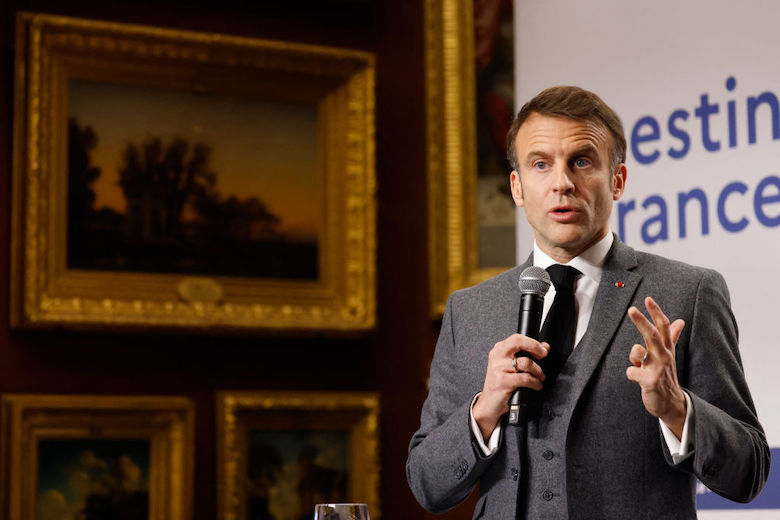President Emmanuel Macron and his freshly installed Prime Minister, Gabriel Attal, appointed a new French cabinet this week. It is little more than a reshuffle – and unlikely to lead to sunlit uplands for Macron’s beleaguered presidency. Of particular significance are the two centre-right ministers whose appointment testifies to the continuing rightward drift of the Macronist project in search of that elusive parliamentary working majority. At the same time, and despite all denials, policy is also being drawn rightwards towards the agenda set by Marine Le Pen and Jordan Bardella’s Rassemblement National on immigration, crime and policing. But the desired effects of the fresh cabinet are already proving vain (as I wrote earlier this week).
The new government has been dubbed Sarkozy IV (after the centre-right president Nicolas Sarkozy, who left office in 2012) for including two of his former ministers: Rachida Dati, who will oversee culture, and Catherine Vautrin, who is charged with leading the mega-ministry of health and work (which has already upset trade unions). Their inclusion was to curry favour with the centre-right Les Républicains in the hope of gaining some of their 62 votes in the National Assembly to allow Macron to press on with his manifesto. However, no sooner had Dati’s name been announced than the leader of Les Républicains excluded her from the party, ensuring that the first test of Attal’s cabinet to attract centre-right votes is a failure. Dati had been serving as the mayor of Paris’s 7th arrondissement for Les Républicains when she was added to Attal’s cabinet.
To make matters worse, media focus has concentrated on the ongoing corruption investigation into the culture minister. Macron, who is no newcomer to political blunders, clearly allowed his zeal for ‘disruptive’ politics to cloud basic common sense. Minister, Prime Minister and President will be forced to exhaust considerable political capital and time defending this rash decision.
Then there is likely to be harmful fallout from the cabinet purge of those centre-left ministers who rebelled against the recent hard-line immigration act. In electing this surprising cabinet, Macron and Attal have created enemies within their own camp. That in turn will further alienate the moderate left in the National Assembly, some of whom, at a push, might otherwise have voted for parts of the Macron programme.
It is too early to say how the cabinet will go down with the public. But there is nationwide cynicism towards Macron’s past gimmicks. The second test of the cabinet – its score at the June European elections – may not be off to a great start either. Macron and his new premier are ostensibly going into the European election campaign on a stridently pro-EU policy at a time when the reputation of the EU in France, and more generally, is not flying high.
Here too Macron, in deploying his penchant for ‘creative destruction’, may have inverted the word order. The initial signalling is not good. The new minister for Europe and foreign affairs, is none other than Attal’s former civil partner, Stéphane Séjourné. There is no doubt that this MEP, erstwhile leader of the president’s party in the European parliament and secretary-general of its French equivalent, will be an effective pro-EU performer. But the optics are so bad. There are bound to be cries of nepotism and cronyism in appointing someone with no experience of foreign affairs to one of the great offices of state. Furthermore, some of Séjourné’s forthright political posturing in the European parliament has already upset foreign governments, notably Morocco. He was one of the leaders of a European parliament resolution last September which was highly critical of the Moroccan authorities for their curtailing of press freedom and alleged corruption of MEPs. His proximity to Macron was seen as a sign of the President’s approval. The Moroccan press has already dubbed the minister ‘a person hostile to Morocco’.
Normally, this would be of little significance. But the problem is that Morocco is important to Macron’s policy of blocking migration from North Africa into Europe and France, as well as being crucial to returning migrants to their home states. Both of those policies depend on the Moroccan government’s goodwill.
There is a clear sense of ‘end of regime’ in France. Macron may have another three years to run, but the chances of him unblocking the parliamentary logjam seem ever distant. According to normal constitutional convention, the President would dissolve parliament. But opinion polls point to a Rassemblement National victory.
On taking office back in 2017, Macron patronisingly pledged to the 11 million Marine Le Pen voters that he would remove the need for them to continue voting for the ‘extreme right’. His style and policies have done anything but that. As a consequence, the popularity and stature of the Rassemblement National has continued to grow; in 2022, 13.2 million voters balloted Marine Le Pen. The writing is on the wall for 2027. And Macron will have played no small part in that victory.







Comments